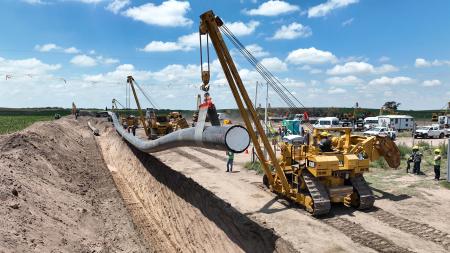The economic and commercial relationship between Argentina and Germany finds key development sectors such as industry, transport, digital transformation and in particular energy, for which the country could become “a strategic supplier”.
This is the context of the visit of the German Chancellor, Olaf Scholz, and his meeting with President Alberto Fernández -plus the meeting of both with businessmen from the two countries-, as part of a regional visit that includes Brazil and Chile with the objective of expanding bilateral trade, the flow of investments and the financing of projects.
Germany is considered Argentina’s main trading partner in the European Union, and bilateral exchange exceeded US$3.6 billion in 2022, with growth of 8% compared to 2021, of which Argentina exported a total of US$883, an increase of 9% year-on-year.
“Argentina can be a reliable partner of Germany supplying gas during the energy transition, and in the medium term it could become a strategic supplier of clean energy, green Hydrogen and its derivatives”Javier Pastorino
Within the framework of this visit, the president of the Argentine-German Chamber of Industry and Commerce (AHK), Javier Pastorinotold Télam that “in the new global geopolitical context, a new chapter of the relationship between the two countries is glimpsed in various strategic axes, particularly in energy.”
“Argentina can be a reliable partner of Germany supplying gas during the energy transitionand in the medium term it could become a strategic provider of clean energy, green Hydrogen and its derivatives”, considered the also vice president of Siemens Energy South Latam.
Pastorino considered that this position “will generate the opportunity for Argentina to diversify and expand its volume of exports“.
“Today we are already working locally on projects -in the development stage- that will produce green Hydrogen derivatives, taking advantage of the excellent renewable resources of our country and at the same time allowing the development of regional economies, professional training and the generation of quality employment in the different provinces,” he added.

Nowadays, More than 170 German companies based in Argentina generate more than 22,000 direct jobs and many thousands indirectly. Several of them have decades of presence in the national market and some more than 100 years.
“The vision of German companies regarding Argentina has always been, is and will be in the medium and long term: We are convinced of the great potential that the country has and that is why we continue to bet on its market and its people,” added the director of the AHK.
German companies, thus, “contribute significantly to the development of the country in key sectors such as energy, industry, transport, digital transformation and commerce. In all of them there is room for even more intense collaboration,” he assured.
According to the reports of the AHK and the Argentine Chamber of Commerce (CAC), In 2022, bilateral trade grew again as in 2021, but it is still 3% below the value of 2019, the year in which it had shown a drop of 15.8% compared to 2018.
The balance of the balance last year registered a deficit of US$1,837 million, which reflected a worsening compared to 2021 given that the balance of bilateral trade had presented a deficit of US$1,716 million.
The year with the highest level of bilateral trade was 2011 with US$6,132 million and, then, between 2012-2019 the average annual value was US$4,696 million.
Precisely, 2011 was the year in which the highest level of national export values was produced for some US$3,157,511 million, but the bilateral balance has been in deficit for the country since 2009 when it achieved a surplus of US$113.3 million.
Among the main exported products currently are bovine meats (28.4% of the total), supply of fuels and lubricants to ships and aircrafts (6.1%) and “Tops” of combed wool (5.8%).
Meanwhile, the main Argentine imports from Germany were dosed immunological products, with 5.6% of the total, followed by medicines with heterocyclic compounds (3.6%) and gas turbine parts (3.3%).


















